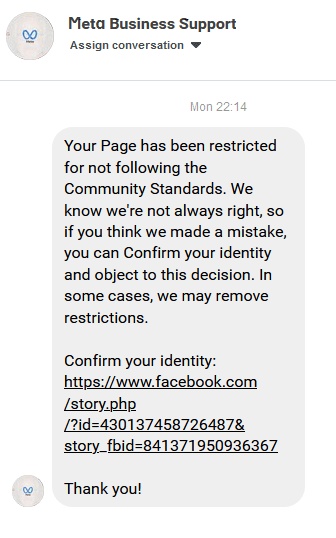Introduction
Over the past few months, numerous Facebook page owners have fallen prey to a concerning trend of receiving fake messages accusing them of violating community standards and subsequently restricting their page. These deceptive messages not only create unnecessary panic among page owners but also serve as a means to exploit them. In this blog post, we will delve into the emergence of these fake restriction messages and shed light on the potential consequences they pose for unaware users.
The Rise of Fake Restriction Messages
Social media platforms like Facebook have become a breeding ground for various deceptive activities, and fake restriction messages are just another addition to the long list. Perpetrators employ phishing emails or misleading redirects to trick page owners into believing their page has been limited due to a breach of community standards. These messages are designed to elicit users' responses, either by requesting personal information or redirecting them to malicious websites.
Exploitation through Identity Confirmation
One common element in these fake restriction messages is the request to confirm your identity. Scammers exploit page owners' fear of losing access to their accounts and manipulate them into providing sensitive information, such as login credentials or personal details. Once obtained, these details can be used for various fraudulent activities, including identity theft, financial scams, or even hacking other social media accounts.
Recognising the Red Flags
It is essential to understand a few red flags to protect yourself from falling victim to such fake messages. Firstly, genuine messages from Facebook regarding policy violations are typically more detailed, specific, and sent through official communication channels. Therefore, any generic or poorly written message should raise suspicion. Secondly, legitimate Facebook messages will never ask users to confirm their identity by providing personal information or login credentials. Being cautious and vigilant while evaluating the authenticity of any message is crucial.

Impacts on Page Owners
The consequences of these fake messages can be detrimental to page owners. They may experience unnecessary stress, fear, and uncertainty about the future of their pages. Furthermore, constant exposure to such deceptive messages can erode trust in legitimate communication from Facebook, making it difficult for page owners to distinguish between real and fake messages.
Steps to Protect Yourself
To safeguard yourself and your Facebook page from falling victim to these fake restriction messages, follow these preventative measures:
- Familiarise yourself with Facebook's official communication methods and guidelines for handling policy violations.
- Verify the legitimacy of any message received by cross-checking it with authentic sources or directly contacting Facebook support.
- Enable two-factor authentication for added security.
- Avoid accessing Facebook via suspicious links or third-party applications.
- Educate your team or fellow administrators about these scams and the importance of staying vigilant.
Conclusion
The rise of fake restriction messages on Facebook poses a direct threat to page owners and erodes trust in the platform's authentic communication channels. By understanding the telltale signs of these deceptive tactics and adopting preventative measures, users can protect themselves from falling into the scammers' traps. It ultimately becomes our responsibility to create awareness and ensure the safety and security of our online presence.
